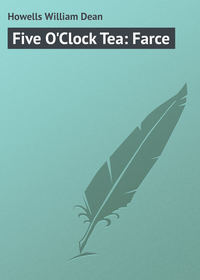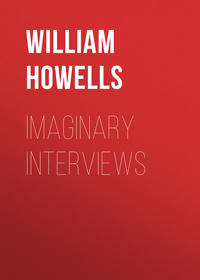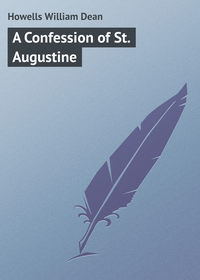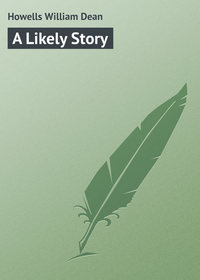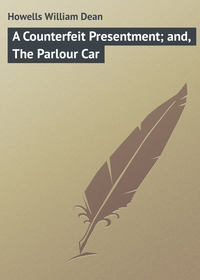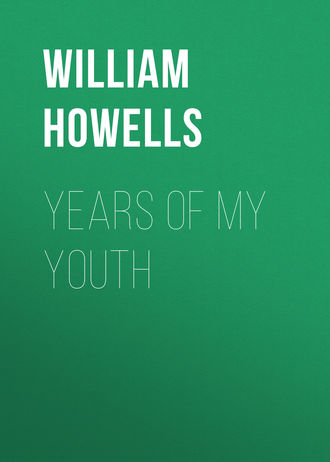 полная версия
полная версияYears of My Youth
There could have been no gayer table than we kept, where we made the most of one another’s jokes, and were richly personal in them, as youth always is. The management was of the simplest, but not incompatible with dignity, for the landlord waited upon the table himself, and whoever the cook might be, the place was otherwise in the sole charge of an elderly maid, with a curious defect of speech, which kept her from answering, immediately or ultimately, any question or remark addressed to her. We valued her for this impediment because of the pathetic legend attaching to it, and we did not value her the less, but the more, because she was tall and lank and uncouth of face and figure, though of a beauty in her absolute faithfulness to her duties and the kindness beyond them which she always showed. The legend was that in her younger if not fairer time she had been married, and when one day her husband, suddenly killed in an accident, was brought home to her, she tried to speak, but could not speak, and then ever afterward could only speak after great stress, and must often fall dumb, and go away without speaking.
I do not know whether we really believed in this or not, but we behaved as if we did, and revered the silent heroine of the tragedy as if it were unquestionably true. What kept me from trying to make it into a poem I cannot say, but I would like to think it was that I felt it above rather than below the verse of even the poet I meant to be. How many rooms she had charge of I could as little say, but I am certain that there were two of us young men in each of them. My own room-mate was a poet, even more actual than myself, though not meaning so much as I to be always a poet; he was reading law, and he meant to practise it, but he had contributed two poems to the Atlantic Monthly before any of mine had been printed there. This might have been a cause of bitterness with me; his work was certainly good enough to be a cause of bitterness, and perhaps I was not jealous because I felt that it would be useless; I should like to believe I was not even jealous of him for being so largely in society before I was. Later, when we came in from our evening calls, we sometimes read to each other, out of what books I could not say now, but probably some poet’s; certainly not our own verse: he was too wise for that and I too shy.
He was then reading law, and sometime in my middle years at Columbus he left us to begin his law practice farther West. In noticing his departure as a friendly journalist should I obeyed his wish not to speak of him as a poet; that, he said, would injure him with his new public; but whether it would or not I am not sure; the Western community is sometimes curiously romantic, and does not undervalue a man for being out of the common in that way. What really happened with him was that, being of a missionary family and of a clerical tradition, he left the law in no great time and studied divinity. It was a whole generation afterward before I saw him again; and now his yellow hair and auburn beard of the early days were all one white, but his gentle eyes were of the old hazel, undimmed by the age that was creeping upon us both. He had followed me with generous remembrance and just criticism in my fiction; and again he made me a sort of professional reproach for dealing in my novels (notably in A Modern Instance) with ethical questions best left to the church, he thought. I thought he was wrong, but I am not sure that I so strenuously think so now; fiction has to tell a tale as well as evolve a moral, and either the character or the principle must suffer in that adjustment which life alone can effectively manage. I do not say ideally manage, for many of the adjustments of life seem to me cruel and mistaken. If it is in these cases that religion can best intervene, I suppose my old friend was right; at any rate, he knows now better than I, for he is where there is no manner of doubt, and I am still where there is every manner of doubt.
I believe, in the clerical foreshadowing of his future, perhaps, he was never of those wilder moments of our young companionship when we roamed the night under the summer moon, or when we forgathered around the table in a booth at the chief restaurant, and over a spirit-lamp stewed the oysters larger and more delicious than any to be found now in the sea; or when, in the quarter-hours of digestion which we allowed ourselves after our one-o’clock dinner we stretched ourselves on the grass, often sunburnt brown, before the College and laughed the time away at anything which pretended itself a joke.
We collegians were mostly Republicans as most of the people we knew were. A few young men in society were not, but they were not of our companionship, though we met them at the houses we frequented, and did not think the worse of them for being Democrats. In fact, there was no political rancor outside of the newspapers, and that was tempered with jocosity. Slavery had been since the beginning of the nation, the heritage of the states from the colonies, and it had been accepted as part of the order of things. We supposed that sometime, somehow, we should be rid of it, but we were not sanguine that it would be soon; and with so many things of pressing interest, the daily cares, the daily pleasures, the new books, the singing and laughing and talking in the pleasant houses, I could leave the question of slavery in abeyance, except as a matter of paragraphing. There had been as many warnings of calamity to come as ever a people had. There had been the breaking of solemn promises from the South to the North; there had been the bloody fights between the sections in Kansas and the treacheries of the national government; there had been the quarrels and insults and violences in Congress; there had been the arrests and rescues of fugitive slaves; there had been the growth of hostile opinion, on one side fierce and on the other hard, maturing on both sides in open hate. There had been all these portents, and yet when the bolt burst from the stormy sky and fell at Harper’s Ferry we were as utterly amazed as if it had fallen from a heaven all blue.
III
Only those who lived in that time can know the feeling which filled the hearts of those who beheld in John Brown the agent of the divine purpose of destroying slavery. Men are no longer so sure of God’s hand in their affairs as they once were, but I think we are surer that He does not authorize evil that good may come, and that we can well believe the murders which Brown did as an act of war in Kansas had not His sanction. In the mad skurry which followed the incident of Harper’s Ferry in 1859 some things were easily shuffled out of sight. Probably very few of those who applauded or palliated Brown’s attempt knew that he had taken men from their wives and children and made his partisans chop them down that their death might strike terror into the pro-slavery invaders, while he forbore from some strange policy to slaughter them with his own hand. His record was not searched to this dreadful fact in my knowledge, either by the Democrats who tried to inculpate the Republicans for his invasion of Virginia or by the Republicans who more or less disowned him. What his best friends could say and what most of them believed, was that he had been maddened by the murder of his sons in Kansas, and that his wild attempt was traceable to the wrongs he had suffered. His own dignity as he lay wounded and captive in the engine-house at Harper’s Ferry, where the volunteer counsel for the prosecution flocked upon him from every quarter, and questioned him and cross-questioned him, did the rest, and a sort of cult grew up which venerated him before his death. I myself was of that cult, as certain fervent verses would testify if I here refused to do so. They were not such very bad verses, as verses, though they were technically faulty in places, but in the light which Mr. Oswald Villard’s history of John Brown has finally cast upon that lurid passage of his life I perceive that they were mistaken. He was not bloodier than most heroes, but he was not a martyr, except as he was willing to sacrifice himself along with others for a holy cause, and he was a saint only of the Old Testament sort of Samuel who hewed Agag in pieces before the Lord. But from first to last he was of the inevitable, and the Virginians could no more have saved themselves from putting him to death than he could have saved himself from venturing his life to free their slaves. Out of that business it seems to me now that they came with greater honor than their Northern friends and allies. The South has enough wrongs against the negroes to answer for in the past and in the present, but we cannot lay wholly to its charge the fate of the slave’s champion; he was of the make of its own sons in his appeal to violence, and apparently the South understood him better than the North. There was then no evil too great for us to think or say of the Virginians, and yet after they could free him from the politicians, mainly Northern, who infested him in the first days of his captivity, to make political capital or newspaper copy out of him, the Virginians tried him fairly, as those unfair things called trials go, and they remained with a sort of respect for him which probably puzzled them. Long after, twenty-five years after, when I was in an ancient Virginia capital it was my privilege to meet some of Governor Wise’s family; and I noted in them this sort of retrospective respect for Brown; they were now of Republican politics, and I found that I was not nearly Black Republican enough for them. But in the closing months of the year 1859 there was no man so abhorred and execrated by the so-called Black Republicans as Governor Wise.
Without going to the files of our own newspaper I cannot now say just how we treated the Harper’s Ferry incident from first to last, but I am safe in saying that it was according to the temperament of each writer. Our chief, who wrote very well when he could detach his interest from the practical politics so absorbing in the capital of a state like Ohio, may have struck the key-note of our opinion in an able leader, and then left each of us to follow with such music as responded in us. My vague remembrance of the result is the daily succession of most penetrating, most amusing comments from my senior. The event offered him the opportunity of his life for that cold irony he excelled in and which he knew how to use so effectively in behalf of a good cause; I do not believe it was ever employed in a bad one. The main contribution to the literature of the event from his junior that I can distinctly recall was that ode or that hymn to John Brown, for which I cannot yet be ashamed or sorry, however I must rue the facts that have forever spoilt my rapture in it. I have the sense of a pretty constant passing from the room where I was studying the exchanges for material, and trying to get my senior’s laugh for something I had written, or staying for him to read me the article he had just begun or finished. It was a great time, though it was a dreadful time, so thick with forecast, if we had only known it, of the dreadfuler time to follow.
While I have been saying this I have been trying to think how much or little our community was shaken by an event that shows so tremendous in the retrospect, and it seems to me little rather than much. People knew the event was tremendous, but so had the battles in Kansas been, and so had the attack on Sumner in the Senate Chamber, and so had the arrests and rescues of the fugitive slaves. They were of the same texture, the same web which fate was weaving about us and holding us faster, hour by hour and day by day while we felt ourselves as free as ever. There must have been talk pretty constant at first, but dying away without having really been violent talk, among people who differed most about it. What I think is that most people were perhaps bewildered, and that waiting in their daze they did not say so much as people would now imagine their saying. Or it may be that my memory of the effect is a blur of so many impressions that it is impossible to detach any from the mass; but I do not think this probable. The fact probably is that people did not realize what had happened because they could not, because their long experience of enmity between the South and North had dulled them too much for a true sense of what had happened.
But I wrote home to my father my disappointment that his paper had not had something “violent” about the John Brown raid. My head, which abstractly passionate and concretely descriptive rhymes had once had wholly to themselves, was now filled with John Brown when it could be relieved of a news-editor’s duty; I thought of him and him only, except when I was making those perpetual calls at those pleasant houses where the young ladies were singing or talking every night. I got some consolation from one of the delightful German editors whom I seemed to know in those days. He was a ’48 man, and he carried in his leg a ball which some soldier of the king had planted there one day when my friend stood behind a barricade in Berlin. He told me, as I read in one of my old letters home, that he had been teaching his children the stories of Schiller, the good poet of freedom, of Robert Blum, the martyr of liberty, and of our John Brown. He says, “My liddle girl, ven I deached dem to her, she veeped.”
But I cannot recall having spoken of Brown with my friend Dr. S., whom I was so apt to speak with of the changing aspects of the slavery question, though I remember very well his coldness to my enthusiasm for the young English poet, Richard Realf, who was so grotesquely Secretary of State in the Republic Brown had dreamed out, but who had passed from Canada with his department before the incident at Harper’s Ferry, and was in Texas at the time of it and of the immediately ensuing events. What affair of state brought him to Columbus after the death of his leader and comrades I did not understand, and I cannot understand yet how he could safely be there within easy reach of any United States marshal, but he was, no doubt, much safer there than in Texas, and he stayed some days, mainly talking with me about himself as a poet rather than as a Secretary of State. He interested me, indeed, much more as a poet, for I already knew him as the author of some Kansas war lyrics, which I am not sure I should admire so much now as I did then. He was a charming youth, perhaps my senior by two years, and so about twenty-four, gentle mannered, sweet voiced, well dressed, and girlishly beautiful. I knew, as he was prompt and willing to tell me again, that he had been a protégé of Lady Byron’s, and that while in her house he had fallen in love with a young kinswoman of hers, and was forced to leave it, for with all his gifts he was the son of an agricultural laborer, and for that reason no desirable match. Yet Lady Byron seemed to have remained fond of him; she had helped him to publish a volume of verse which he had called Guesses at the Beautiful (I envied him the title), and at parting she had given him a watch for a keepsake and money to bring him to America. He showed me the watch, and I dare say the volume of poems, but I am not sure as to this, and I vouch for no particular of his story, which may very well have been wholly true. In the long walks and long talks we had together, when he cared more to speak of his literary than his military life, I cannot make out that he expected to help further in any attack upon the South. Apparently he shared the bewilderment which every one was in, but he did not seem to be afraid or anxious for himself as part of the scheme that had so bloodily failed. He was not keeping himself secret, and he went on to Canada as safely as he had come from Texas, if indeed he went to Canada. While he was briefly with us a hapless girl, of those whom there is no hope for in this life, killed herself, and Realf went to the wicked house where she lay dead, out of some useless pathos, since she was dead. I reported the fact to my friend Dr. S. with a faltering tendency, I am afraid, to admire Realf for it, and the doctor said, coldly, Yes, he had better kept away; his motive had already been scandalously construed. It was this world speaking at its best and wisest, but I am not sure that it altogether persuaded me.
IV
Realf’s stay in Columbus must have been in that time of abeyance between Brown’s capture and his death; but it must have been after the hanging at Charlestown that one night I was a particle of the crowd which seemed to fill the State House yard on its western front, dimly listening to the man whose figure was a blur against the pale stone. I knew that this man was that Abraham Lincoln who had met Stephen A. Douglas in the famous Illinois debates, and who was now on his way home to Illinois from his recognition in the East as a man of national importance. I could not well hear what he said, and I did not stay long; if I had heard perfectly, I might not, with my small pleasure in public speaking, have stayed long; and of that incident, and of the man whom history had already taken into her keeping, and tragedy was waiting to devote to eternal remembrance, I have only the vision of his figure against the pale stone, and the black crowd spread vaguely before him. Later I had a fuller sense of his historic quality, but still so slight, when he stood on the great stairway within the State House and received the never-ending crowd which pushed upward, man and woman after man and woman, and took his hand, and tried to say something as fit as it was fond. That would have been when he was on the journey, which became a flight, to his inauguration as President at Washington. He had been elected President, and the North felt safe in his keeping, though the dangers that threatened the nation had only gathered denser upon it, and the strange anomaly which called itself the government had been constantly betraying itself to the hostility within it and without.
The people who pushed upward to seize the great hand held out to every one looked mostly like the country folk such as he had been of, and the best of him always was, and I could hear their hoarse or cracked voices as they hailed him, oftenest in affectionate joking, sometimes in fervent blessing; but for anything I could make out he answered nothing. He stood passive, submissive, with the harsh lines of his lower face set immovably, and his thick-lashed eyes sad above them, while he took the hands held up to him one after another, and shook them wearily, wearily. It was a warm day such as in late February, or earliest March, brings the summer up to southern Ohio before its time, and brings the birds with it for the delusion of a week or a fortnight; and as we walked out, my companion and I, we left a sweltering crowd within the State House, and, straying slowly homeward, suffered under a sun as hot as June’s.
V
I do not say July’s sun or August’s, because I wish my reader to believe me, and any one who has known the July or August, or the September even, of southern Ohio has known something worse than tropical heat, if travelers tell the truth of the tropics; and no one could believe me if I said such heat ever came in February or March. There were whole fortnights of unbroken summer heat in Columbus, when the night scarcely brought relief from the day, and the swarming fly ceded, as Dante says, only to the swarming mosquito. Few people, even of those who might have gone, went away; none went away for the season, as the use is now, though it is still much more the use in the East than in the West. There were excursions to the northern lakes or to Niagara and down the St. Lawrence; there were even brief intervals of resort to Cape May; but the custom was for people to stay at home, to wear the thinnest clothes, and drink cooling drinks, and use fans, and try to sleep under mosquito-bars, after sitting out on the front steps. That was where calls were oftenest paid and received, and as long as one was young the talk did not languish, though how one did when one was old, that is, thirty or forty, or along there, we who were young could not have imagined. There was no sea or any great water to send its cooling breath over the land which stretched from the Ohio River to Lake Erie with scarcely a heave of its vast level. We had not even the satisfaction of knowing that we were suffering from a heat-wave; the notion had not been invented by quarter of a century yet; we suffered ignorantly on and on, and did not intermit our occupations or our pleasures; some of us did not even carry umbrellas against the sun; these we reserved for the rain which could alone save us, for a few hours in a sudden dash, or for a day in the storm that washed the air clean of its heat.
The deluging which our streets got from these tempests was the only cleaning which I can recollect seeing them given. There was indeed a chain-gang which intermittently hoed about in the gutters, but could not be said to clean them, while it remained the opprobrium of our civilization. It was made up mostly of negroes, but there were some drink-sodden whites who dragged a lengthening chain over the dust or hung the heavy ball which each wore over the hollows of their arms when urged to more rapid movement. Once I saw, with a peculiar sense of our common infamy in the sight, a quite well-dressed young man, shackled with the rest and hiding his face as best he could with eyes fastened on the ground as he scraped it. Somehow it was told me that he had been unjustly sentenced to this penalty, and the vision of his tragedy remains with me yet, as if I had acted his part in it. I dare say it was not an uncommon experience by which when I used to see some dreadful thing, or something disgracefully foolish, I became the chief actor in the spectacle; at least I am certain that I suffered with that hapless wretch as cruelly as if I had been in his place. Perhaps we are always meant to put ourselves in the place of those who are put, or who put themselves, to shame.
Municipal hygiene was then in its infantile, if not in its embryonic stage, and if there was any system of drainage in Columbus it must have been surface drainage, such as I saw in Baltimore twenty-five years later. After the rain the sun would begin again its daily round from east to west in a cloudless sky where by night the moon seemed to reflect its heat as well as its light. They must still have such summers in Columbus, and no doubt the greatest part of the people fight or faint through them as they do in our cities everywhere, but in those summers even the good people, people good in the social sense, remained, and not merely the bad people who justly endured hardship because of their poverty. I had become accustomed to the more temperate climate of the Lake Shore, and I felt the heat as something like a personal grievance, but not the less I kept at work and kept at play like the rest. Once only I was offered the chance of escape for a few days (it was in the John Brown year of 1859) when I was commissioned to celebrate the attractions of a summer resort which had been opened a few hours away from the capital. I had heard much talk of the coolness of White Sulphur, as it was called, and I expected much more than I had heard, but I now got much more than I had expected.
There must have been a break in the heat when at some unearthly hour of the July morning I had taken the train which would leave me at White Sulphur, but in the sleep which youth can almost always fall into I was not sensible of it. I say fell into, but I slept upright as one did on the trains in those times, and when my train stopped at the station which as yet made no sign of being a station I stumbled down the car steps to a world white with frost in the July morning. My foot slid over the new planking of the platform as on ice, and on the way up to the new hotel the fences bristled with the glacial particles which bearded the limbs of the wayside trees, and the stubble of the wheat and fields, and the blades of the corn, and sparkled in the red of the early sun which was rising to complete the devastation. I was in those thinnest summer linens, with no provision of change against such an incredible caprice of the weather, and when I reached the hotel there was no fire I could go to from the fresh, clean, thrillingly cold chamber, with its white walls and green lattice door, which I was shown into. No detail of the time remains with me except what now seems to have been my day-long effort to keep warm by playing nine-pins with a Cincinnati journalist, much my senior, but as helpless as myself against the cold. There must have been breakfast and dinner and supper, with their momentary heat, but when I went to bed I found only the lightest summer provision of sheet and coverlet, and I was too meek to ask for blankets.




